Are Outdoor Weddings Legal in the UK? Understanding the Rules and Regulations
Outdoor weddings have recently seen a surge in popularity in the UK, offering couples the chance to exchange vows against the backdrop of picturesque gardens, beaches, or countryside. If you’re planning your special day and considering an outdoor setting, you might be wondering about the legalities involved. The good news is that outdoor civil wedding and partnership ceremonies have been legalised permanently in England and Wales. This change enables couples to have more flexibility when planning their nuptials and can now include outdoor spaces at licensed venues for their official ceremonies.
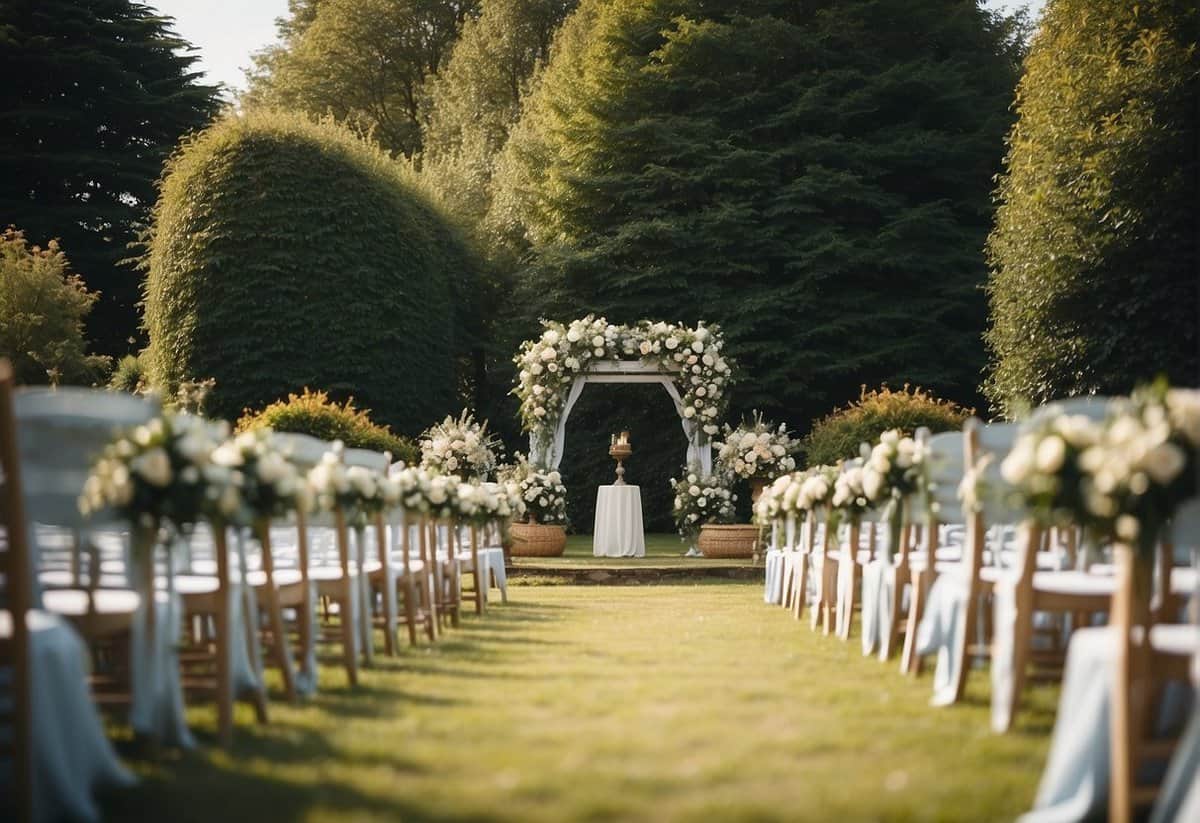
The COVID-19 pandemic significantly impacted wedding regulations, prompting a reevaluation of traditional wedding formats. In response to social distancing measures and restrictions on indoor gatherings, there was a temporary allowance for outdoor ceremonies. The overwhelming support from the public and industries related to tourism and hospitality has ensured that these outdoor ceremonies are here to stay. With this permanent legalisation, venues that are already licensed for civil ceremonies have the opportunity to host weddings in their outdoor spaces, thus accommodating the evolving preferences of couples and the necessity for greater flexibility in wedding planning.
Key Takeaways
- Outdoor civil weddings and partnerships are officially recognized in England and Wales.
- The shift to legally recognize outdoor ceremonies was solidified following adaptions from the COVID-19 pandemic.
- Licensed venues can now host legal outdoor weddings, offering couples diverse options for their ceremony locations.
Legality and Regulations of Outdoor Weddings
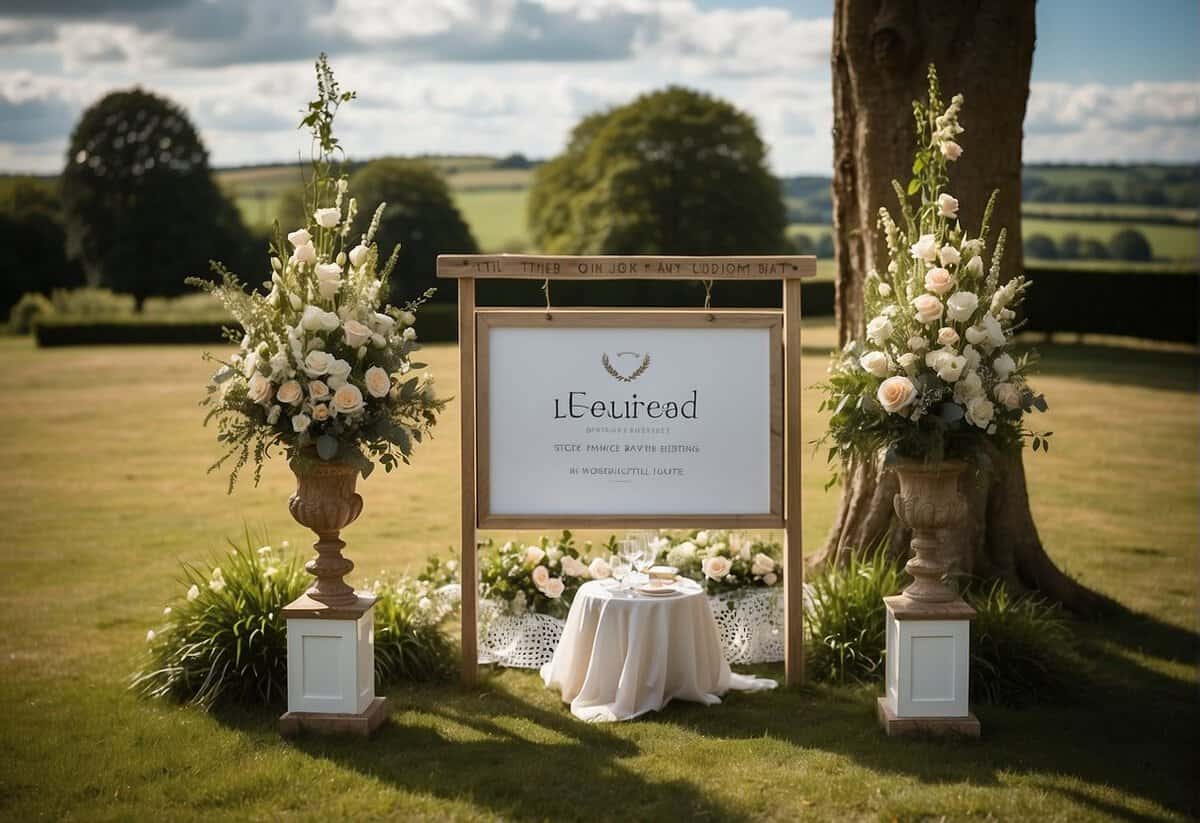
In the UK, your options for outdoor wedding venues have expanded due to changes in the law, offering you more flexibility for your special day. Understanding the specific legalities and regulations will ensure that your plans align with the most current legislation.
Marriage Law Overview
Permanent Structure Requirement: Historically, UK law mandated that your marriage ceremony must take place in a permanent structure with a solid roof, if not in a religious establishment. This regulation was to ensure that ceremonies occurred in suitably dignified settings.
Changes in Legislation: However, recent legal reforms have broadened the scope of where you can legally tie the knot. Specifically, the Law Commission has been reviewing and suggesting reforms to wedding legislation, which may further impact where and how wedding ceremonies can be conducted.
Ceremonies and Civil Partnerships
Civil Weddings: A civil wedding can now be legally conducted outside, thanks to temporary legislation brought in since the previous summer, which has received overwhelming support to become permanent. This means you can legally marry outdoors at approved premises, like hotels or stately homes.
Approved Premises: Not all venues are eligible, so be sure to check if your intended venue is classified as an approved premises for outdoor civil ceremonies. The rules that previously required indoor venues with permanent structures have been relaxed, so many more places have become viable options for your ceremony.
Remember, whether you opt for a traditional indoor setting or a fresh outdoor ambiance, your ceremony needs to comply with current UK laws and venue regulations.
Impact of COVID-19 on Wedding Regulations
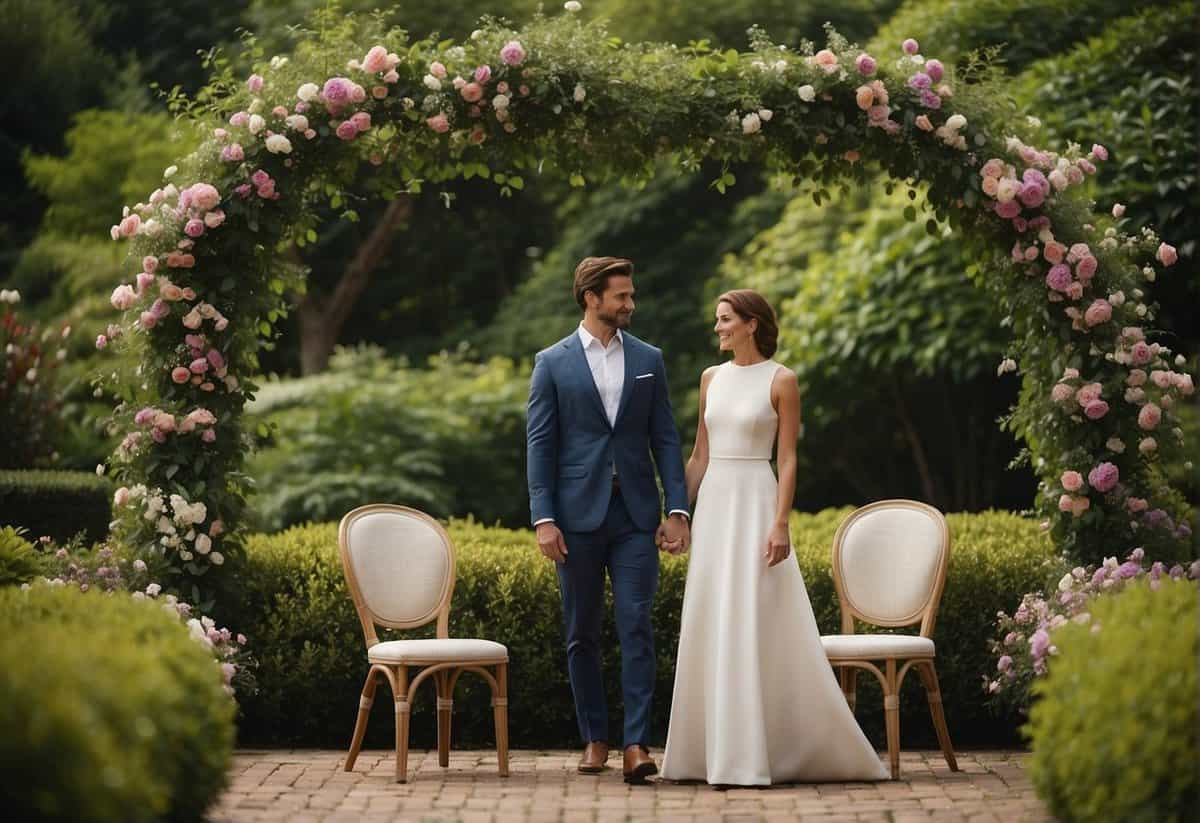
The COVID-19 pandemic has brought about significant changes within the realm of wedding regulations in the UK, influencing both temporary measures and sparking permanent legislative changes post-pandemic to accommodate the shifting social landscape.
Temporary Measures and Amendments
During the pandemic, you might recall that the UK government introduced temporary measures to adjust traditional wedding ceremonies. Due to the necessity for social distancing, there was a cap on the number of attendees, and for the first time, outdoor civil weddings and civil partnerships were permitted. These were initially temporary amendments made as a direct response to the pandemic. One of the key temporary legislations was a government consultation that found overwhelming support for these changes.
Permanent Changes Post-Pandemic
The temporary adjustments you’ve experienced didn’t end with the pandemic. A review of these changes led to a decision by the Ministry of Justice to modernise the wedding ceremony process. As a result, in what may be a silver lining to the distress caused by COVID-19, the government, led by the justice minister, has made the allowance for outdoor civil weddings and partnerships to be made permanent. This decision was based on feedback from the public and a recognition that the flexibility could continue to benefit couples in the future. The revised legislation reflects a modern approach to wedding ceremonies in the UK.
Venue and Location Considerations

When planning your outdoor wedding in the UK, it’s essential to know that venues need to meet specific legal requirements. Whether you dream of a grand event at a hotel or an intimate ceremony in a church garden, understanding the rules for Approved Premises and the distinctions between religious and non-religious ceremonies venues will ensure your day goes smoothly.
Approved Premises and Structures
For your wedding to be legally recognized, the venue must be an Approved Premise. This means hotels, outdoor areas, and even the grounds of places of worship must be certified for civil partnership registration. The flexibility of outdoor spaces allows for a variety of setups, but it’s crucial to ensure that there is clear signage and the space is deemed fit for purpose. Always consult with the venue’s responsible person to confirm that the outdoor area you like is approved and prepare any necessary changes well in advance.
Religious and Non-Religious Options
If you’re considering a religious ceremony, the rules are different. Certified places of worship, including churches and the grounds of such establishments, can host your wedding without the need for additional approval, ensuring the ceremony is recognized by both religious and civil law. For non-religious options, a celebrant can lead your ceremony almost anywhere outdoors, but you’ll still need to sign the legal paperwork at a registered venue. Keep in mind that while religious ceremonies typically include public access, non-religious ceremonies led by a celebrant could offer you a bit more privacy and space.
The Future of Wedding Ceremonies in the UK
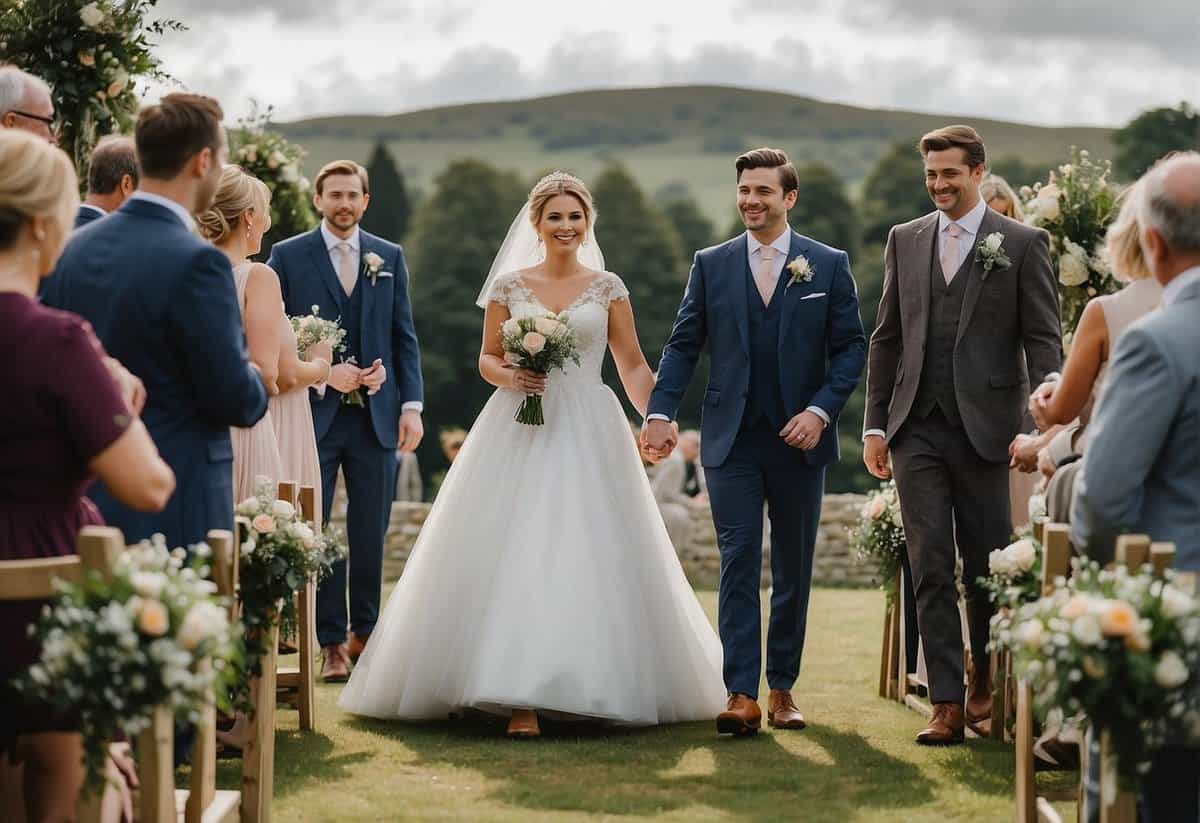
The UK is embracing a more flexible approach to nuptials, with fresh reforms introducing a wealth of choices for your special day.
Reforms and Greater Choices
With the legalisation of outdoor civil weddings and partnerships, you can now celebrate your union under the open sky. This is part of a broader Law Commission review aimed to modernise marriage law and provide greater choice for couples looking to personalise their ceremonies. Such reforms are a step towards more relaxed wedding regulations, allowing for celebrations that reflect your individual preferences.
Consultations and Reactions from the Wedding Industry
The reactions from the wedding industry have been overwhelmingly positive. A consultation showed a clear demand for these changes, with a 96% backing to make the relaxed rules permanent. The Justice Secretary has echoed this sentiment, aiming to modernise marriage law and support the burgeoning wedding sector. Your opportunities for personalised ceremonies outdoors are expected to continue growing, bolstered by this industry support. The future promises a more bespoke experience tailored to your vision of the ideal wedding.
Frequently Asked Questions
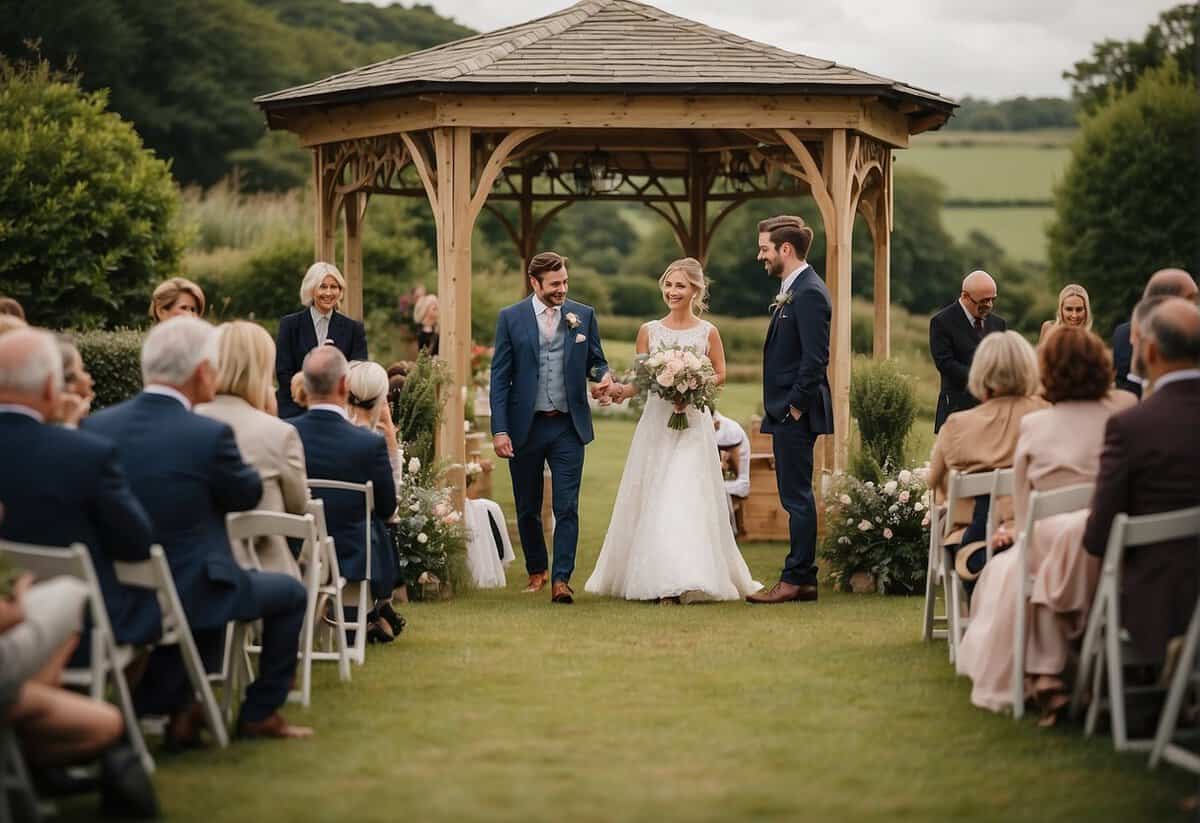
In this section, you’ll find answers to some common queries about outdoor wedding ceremonies in the UK, which will help you understand what’s legally required for your special day.
What are the regulations for having an outdoor wedding ceremony in the UK?
Outdoor wedding ceremonies in the UK require the venue to be licensed. Since April 2022, you have more options as these licenses now cover outdoor spaces too.
Are there licensed venues for outdoor weddings across the UK?
Yes, there are numerous venues across the UK licensed for outdoor weddings. Each venue needs to comply with specific guidelines and regulations to obtain and maintain their license.
Can couples legally marry in a public park within the UK?
While public parks make for a picturesque setting, they must be specifically licensed for you to legally marry there. Consult local authorities to see if your chosen park is licensed for weddings.
What is the process to get a wedding venue licensed for an outdoor ceremony in the UK?
To get a wedding venue licensed, the venue must apply to the local council, meet specific criteria, and undergo a thorough assessment to ensure it is a fitting place for a wedding.
Is it possible to have a legally binding wedding ceremony in my own garden in the UK?
Your garden can be a location for a legally binding wedding ceremony only if it gets licensed. Typically, this involves fulfilling stringent legal requirements, which might be feasible for some private properties.
How have the UK’s wedding laws changed recently regarding outdoor ceremonies?
Wedding laws in the UK have evolved to allow greater flexibility for couples wishing to marry outdoors. Regulations passed in April 2022 made these options permanent, following a temporary allowance during the COVID pandemic.


